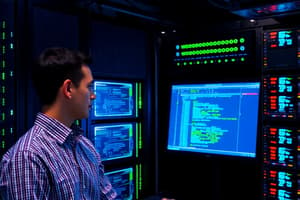Podcast
Questions and Answers
What is the primary purpose of the twisting in copper UTP cables?
What is the primary purpose of the twisting in copper UTP cables?
- To support higher data rates
- To improve cable flexibility
- To reduce electromagnetic interference (correct)
- To enhance aesthetic appeal
What defines a crossover cable compared to a straight-through cable?
What defines a crossover cable compared to a straight-through cable?
- Both ends have the same wiring arrangement
- It is used only for fiber-optic connections
- It has a thicker insulation layer
- One end has a different wiring arrangement (correct)
Which of the following standards governs the implementation of Ethernet?
Which of the following standards governs the implementation of Ethernet?
- IEEE 802.11
- IEEE 802.15
- IEEE 802.3 (correct)
- IEEE 802.5
Which type of fiber-optic cable is best suited for long-distance transmissions?
Which type of fiber-optic cable is best suited for long-distance transmissions?
What crucial factors do the IEEE 802.3 standards specify?
What crucial factors do the IEEE 802.3 standards specify?
Which type of network devices would typically require a straight-through cable to connect?
Which type of network devices would typically require a straight-through cable to connect?
What are the two main types of fiber-optic cables?
What are the two main types of fiber-optic cables?
What kind of communication issues can arise from using the wrong type of cable?
What kind of communication issues can arise from using the wrong type of cable?
What does the core of a fiber-optic cable do?
What does the core of a fiber-optic cable do?
What is the main purpose of the cladding in a fiber-optic cable?
What is the main purpose of the cladding in a fiber-optic cable?
What is a significant disadvantage of fiber-optic cables compared to copper cables?
What is a significant disadvantage of fiber-optic cables compared to copper cables?
Which of the following layers is responsible for providing network services directly to end-users?
Which of the following layers is responsible for providing network services directly to end-users?
Which material is NOT commonly used for the jacket of fiber-optic cables?
Which material is NOT commonly used for the jacket of fiber-optic cables?
What characteristic does a high refractive index of the core of a fiber-optic cable provide?
What characteristic does a high refractive index of the core of a fiber-optic cable provide?
What role does the Presentation Layer play in the OSI model?
What role does the Presentation Layer play in the OSI model?
Which layer of the OSI model is responsible for managing communication sessions?
Which layer of the OSI model is responsible for managing communication sessions?
What is a primary function of the OSI Reference Model?
What is a primary function of the OSI Reference Model?
Which of the following protocols is NOT included in the Application Layer of the OSI Model?
Which of the following protocols is NOT included in the Application Layer of the OSI Model?
What percentage of the CCNA exam is focused on IP Connectivity?
What percentage of the CCNA exam is focused on IP Connectivity?
Which of the following best describes a network?
Which of the following best describes a network?
What role does Cisco Packet Tracer serve in the CCNA curriculum?
What role does Cisco Packet Tracer serve in the CCNA curriculum?
Which of the following is NOT a key element of a network?
Which of the following is NOT a key element of a network?
What is the primary purpose of a network?
What is the primary purpose of a network?
Which among the following domains has the least focus in the CCNA exam?
Which among the following domains has the least focus in the CCNA exam?
What is established by earning the CCNA certification?
What is established by earning the CCNA certification?
Which type of devices are included in the definition of a network?
Which type of devices are included in the definition of a network?
What is the primary function of the Transport Layer in networking?
What is the primary function of the Transport Layer in networking?
Which protocol is most suitable for applications requiring error recovery?
Which protocol is most suitable for applications requiring error recovery?
What distinguishes User Datagram Protocol (UDP) from Transmission Control Protocol (TCP)?
What distinguishes User Datagram Protocol (UDP) from Transmission Control Protocol (TCP)?
What is a key responsibility of the Internet Layer in networking?
What is a key responsibility of the Internet Layer in networking?
What is one of the primary responsibilities of system administrators?
What is one of the primary responsibilities of system administrators?
How does the Transport Layer contribute to global connectivity?
How does the Transport Layer contribute to global connectivity?
Which of the following is NOT a role of network administrators?
Which of the following is NOT a role of network administrators?
Which of the following is a benefit of CCNA 200-301 certification?
Which of the following is a benefit of CCNA 200-301 certification?
Which key area is NOT covered by the CCNA 200-301 certification?
Which key area is NOT covered by the CCNA 200-301 certification?
What could be a consequence of insufficient system and network administration?
What could be a consequence of insufficient system and network administration?
What is the maximum duration for completing the CCNA 200-301 exam?
What is the maximum duration for completing the CCNA 200-301 exam?
What aspect does NOT typically fall under the responsibilities of network administrators?
What aspect does NOT typically fall under the responsibilities of network administrators?
Which of the following describes the role of a system administrator best?
Which of the following describes the role of a system administrator best?
What can be said about the questions in the CCNA 200-301 exam?
What can be said about the questions in the CCNA 200-301 exam?
Which of the following is a critical task of network administrators?
Which of the following is a critical task of network administrators?
Study Notes
Introduction to System and Network Administration
- System and Network Administration is essential for maintaining IT infrastructures in organizations.
- System Administrators manage servers, operating systems, software, and user accounts.
- Network Administrators configure and monitor network devices ensuring efficient data flow and connectivity.
Roles of System Administrators
- Ensure installation, configuration, and maintenance of servers.
- Keep systems updated with the latest patches and security measures.
- Manage user accounts and troubleshoot software, hardware, and connectivity issues.
Roles of Network Administrators
- Design, configure, and monitor network infrastructures.
- Configure routers, switches, and firewalls for data transmission.
- Monitor performance and implement optimizations for speed and reliability.
- Enforce security measures to protect networks from unauthorized access and cyber threats.
Importance of Administration
- Protects critical systems and data while ensuring availability to authorized users.
- Prevents downtime, data breaches, and productivity loss that can impact finances and reputation.
CCNA 200-301 Certification
- Offered by Cisco Systems, validating foundational knowledge for entry-level network professionals.
- Recognized in the IT industry, covering various networking concepts and technologies.
- Helps develop a well-rounded understanding of networking principles.
Topics Covered in CCNA 200-301
- Network fundamentals, Ethernet LAN, switching, and routing protocols.
- Network security, wireless networking, and network automation.
CCNA 200-301 Exam Details
- Comprises about 100 multiple-choice and drag-and-drop questions, to be completed in 120 minutes.
- Assesses knowledge of networking concepts and troubleshooting Cisco devices.
Benefits of CCNA 200-301 Certification
- Globally recognized, providing a competitive edge in the job market.
- Comprehensive knowledge across a range of networking topics.
- Validates skills, establishing credibility as a networking professional.
- Serves as a pathway for advanced certifications and career growth in IT.
Six Logical Domains of CCNA Exam
- Network Fundamentals (20%), Network Access (20%), IP Connectivity (25%).
- IP Services (10%), Security Fundamentals (15%), Automation and Programmability (10%).
Cisco Packet Tracer
- A network simulator that allows simulation of Cisco network devices.
- Used primarily as a tool for CCNA labs, though it doesn’t run real Cisco IOS.
Network Fundamentals
- Networks are collections of interconnected devices that enable data exchange and resource sharing.
- Critical in facilitating communications, from local to global infrastructures.
Key Elements of a Network
- Devices: Include computers, servers, routers, switches, and unique addressing for communication.
- Data Transmission: Occurs via physical (copper cables, optical fibers) or wireless channels (Wi-Fi).
- Copper UTP Connections: Common network cables consisting of twisted copper wires that enhance signal integrity.
IEEE 802.3 Standards (Copper)
- Governs Ethernet technology implementation, ensuring interoperability among devices across manufacturers.
- Specifies various Ethernet types, cable length limits, and transmission rates.
Types of Network Cables
- Straight-Through Cables: Same wiring arrangement on both ends, connecting different devices.
- Crossover Cables: Different wiring arrangement for direct communication between similar devices.
Fiber-optic Connections
- Allow high-speed, long-distance data transmission using light signals.
- More costly and require specialized skills for installation compared to copper cables.
- Two Main Types:
- Single-Mode: Designed for long-distance transmission with minimal dispersion.
- Multimode: Suitable for shorter distances within buildings.
Anatomy of a Fiber-Optic Cable
- Core: Central part for light transmission, made of glass or plastic.
- Cladding: Surrounds the core to retain light signals and reduce loss.
- Jacket: Provides protection and is made from materials like PVC.
Conceptual Models of Networking
- Provide structured frameworks to understand network complexities.
- Two Prominent Models:
- OSI Model: A seven-layer framework enabling efficient technology and protocol integration.
- Application Layer, Presentation Layer, Session Layer, Transport Layer, Internet Layer, and others.
- OSI Model: A seven-layer framework enabling efficient technology and protocol integration.
OSI Model Layers
- Application Layer: Provides services to end-users via protocols like HTTP and FTP.
- Presentation Layer: Handles data representation and conversion.
- Session Layer: Manages communication sessions.
- Transport Layer: Ensures end-to-end communication, featuring TCP and UDP for data transfer accuracy.
- Internet Layer: Responsible for logical addressing and packet routing across networks.
Studying That Suits You
Use AI to generate personalized quizzes and flashcards to suit your learning preferences.
Description
Explore the fundamentals of System and Network Administration essential for the CCNA 200-301 Certification. This quiz covers key roles, responsibilities, and the importance of maintaining effective IT infrastructures in organizations. Test your knowledge on administration concepts and prepare for your certification.



